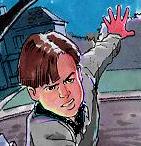The First Doctor WhoStory Ever Told |  |
Episode Three |
 |
The First Doctor WhoStory Ever Told |  |
Episode Three |
 |
Abide with me, fast falls the eventide
The darkness deepens, Lord with me abide.
When other helpers fail and comforts flee,
Help of the helpless, O Abide with me.
I fear no foe, with Thee at hand to bless;
Ills have no weight, and tears no bitterness;
Where is death's sting? where, grave, thy victory?
I triumph still, if Thou abide with me.